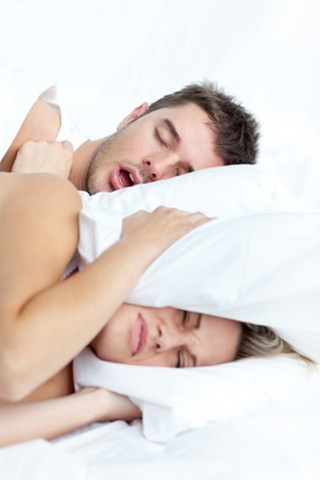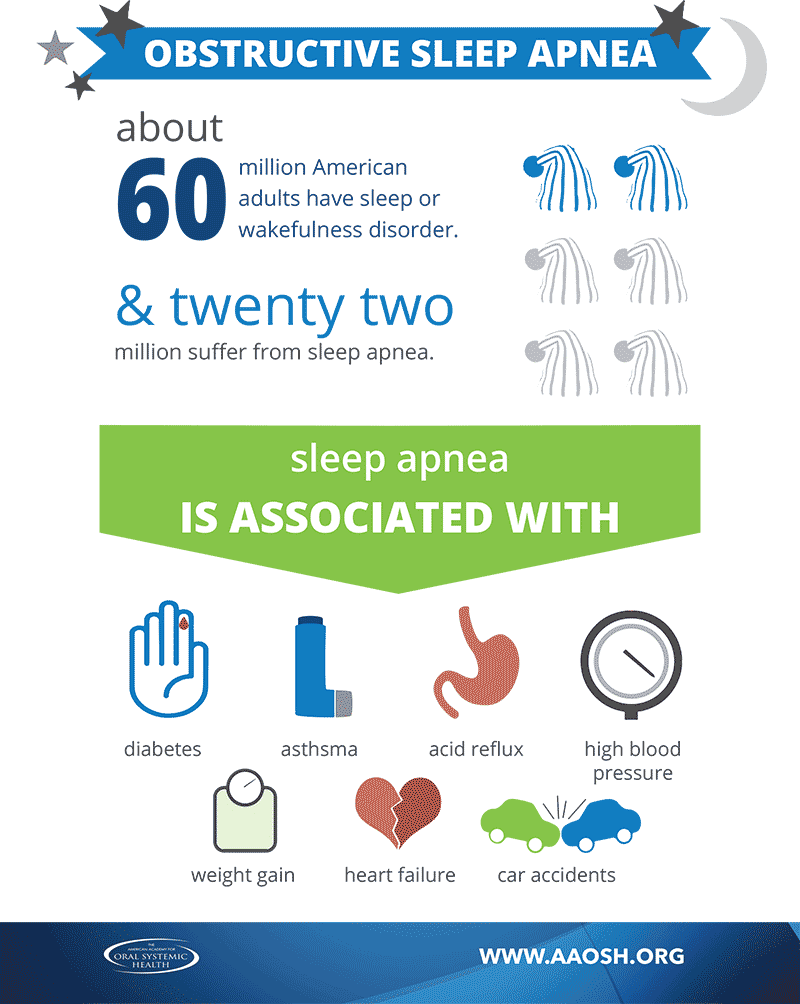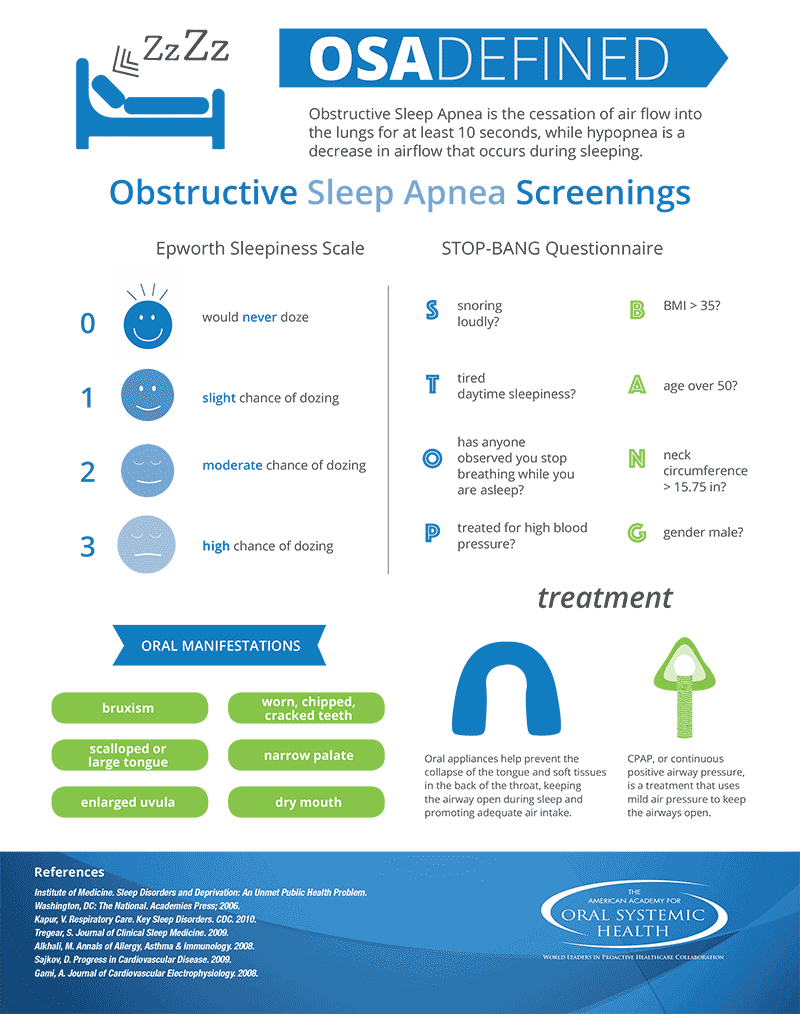Dental Sleep Medicine
Snoring and Sleep Apnea and How We Can Help
Do you recognise or suffer from any of the following:
- Daytime sleepiness, tiredness or fatigue?
- Snoring, be it yourself, your partner or your children?
- Waking up with choking or gasping?
- Inability to remain fully awake or alert during wake hours?
- Waking up with a dry mouth or a sore throat?
- Poor concentration or memory?
- Irritability or mood changes?
- Waking up to go to the toilet at night?
- Decreased libido?
- Morning headaches?
 All these are common signs and symptoms of sleep issues, which, if left undiagnosed can lead to major health problems.
All these are common signs and symptoms of sleep issues, which, if left undiagnosed can lead to major health problems.
Research has shown that over 30% of adults over 30 years of age snore, up to 70% of these have the medical condition sleep apnea and 85% of these are unaware they have it.
Recent studies estimate that for North America, sleep apnea is commonly found in 20-30% of males and 10-15% of females (using AHI>5/hr, Young et al,WMJ 2009; 108:246)
So, what causes snoring and what is sleep apnea?
Snoring
Snoring occurs due to the vibration of tissue in the soft palate and tongue, which relax when sleeping. Snoring by itself does not cause health issues other than disrupting the sleep of family, however it has been shown to be related to increased risk of sleep apnea and other health conditions.
Sleep Apnea
Sleep apnea is a more severe medical condition, which causes partial or full blockage of the airway, thus causing lower oxygen levels. When the brain detects inadequate oxygen it arouses the sufferer, waking them up to open airways, and thus disrupting sleep patterns. This has been scientifically proven to worsen blood pressure and increase the risk of heart disease, stroke and diabetes. It also causes excessive sleepiness, fatigue and loss of concentration during the day. In ages 30-60yrs, an estimated 24% of men and 9% of women have Obstructive sleep apnea, more than 80% undiagnosed (Young et al, Sleep 1997; 20:705)
So how can Dr Matthew Flemming at Hartwell Dentistry help?
Dentists are in a great position to help diagnose this life threatening condition as well as provide treatment. It is essential that your dentist or your medical doctor work in conjunction with a specialist Sleep Physician to diagnose the presence and severity of the condition. This can only be evaluated via a sleep study, of which technology allows to be done at home over one night. Many years of research and development has led to the establishment of the 2 main treatments of snoring and sleep apnea.
CPAP machine
For severe sleep apnea a CPAP machine is the gold standard of care.
This stands for “Continuous Positive Airway Pressure”, which involves the delivery of air under pressure from a machine through the nose via a mask. The pressure maintains an open airway. Although effective, compliance is poor with only 27% preferring CPAP to MAS [Mandibular advancement splint]
Dental Sleep Appliance
For snoring and mild to moderate sleep apnea a dental sleep appliance is widely regarded as the first line of treatment.
These work by gently holding the lower jaw forward, which effectively moves the tongue away from the back of the airway causing the airway to remain open so that breathing is normalized. Research has now shown that an appliance is also helpful in severe cases when the patient does not accept a CPAP.
Many other treatments are available but are recognized professionally as unsafe and ineffective. For example, non-customized appliances, pillows, nasal strips and breathing programs have proven to be of little benefit.
The only 2 effective treatments that have been developed and researched for over 30 years are the CPAP and Dental sleep appliances. These both have extensive scientific evidence that confirm their safety and effectiveness.
Here at Hartwell Dentistry we can help in the screening, the referral to a specialist sleep physician and if appropriate, the fitting of an oral sleep appliance.
Member of Australasian Sleep Society
![]() Dr Matthew Fleming is a member of the Australasian Sleep Society (ASA), which includes Sleep Physicians, Dentists, Sleep Psychologists and Sleep Technicians. DR Fleming regularly attends ASA meeting and has completed many Dental Sleep Medicine training courses.
Dr Matthew Fleming is a member of the Australasian Sleep Society (ASA), which includes Sleep Physicians, Dentists, Sleep Psychologists and Sleep Technicians. DR Fleming regularly attends ASA meeting and has completed many Dental Sleep Medicine training courses.
Increase Overall Health
Helping patients who have this serious condition is very rewarding, as it immensely improves their quality of life. Undiagnosed severe sleep apnea has been shown to reduce the lifespan of an individual more than what smoking would. Ultimately, treating all types of sleep apnea significantly increases a person’s the overall health.
Hartwell Dentistry looks forward to helping people who may have this medical condition. So don’t be surprised if we ask you to fill out a screening questionnaire, it’s in your best interests to make sure that you receive help if needed.



